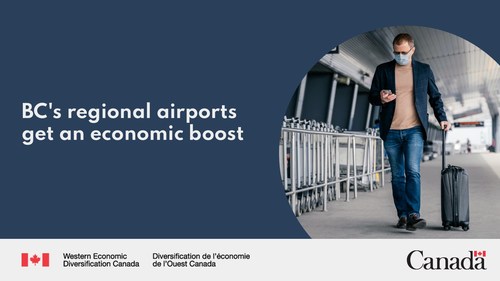Targeted Government of Canada support will be provided by Western Economic Diversification Canada
VANCOUVER, BC, July 30, 2021 /CNW/ – Regional air transportation is crucial to ensure merchandise circulates, supply chains are maintained, and regional economic growth continues. The pandemic has had major impacts on regional air transportation ecosystems, affecting economies, communities, and local businesses.
The Government of Canada’s Regional Air Transportation Initiative (RATI), launched in March 2021, fosters access to air transportation and supports regional ecosystems. In particular, it enables regional air carriers and airports to remain operational in these difficult times and to continue to contribute to regional economic growth, while adapting to new post-COVID-19 realities and requirements.
B.C. airports to benefit from funding
With this in mind, Terry Beech, Parliamentary Secretary to the Minister of Fisheries, Oceans and the Canadian Coast Guard and to the Minister of Economic Development and Official Languages (B.C.), on behalf of the Honourable Mélanie Joly, Minister of Economic Development and Official Languages and Minister responsible for Western Economic Diversification Canada, announced $11,721,721 in RATI funding for 11 regional airports in B.C.
This funding will enable these airports to overcome challenges that were brought on by the impact of the COVID-19 pandemic.
Regional air transportation is key to the economic development of communities and businesses across Canada. Since it helps draw Canadians to rural and remote communities to work and raise their families, while also providing reliable connectivity with urban centres, it plays a crucial role in a just, inclusive recovery for all, throughout the country.
Quotes
“It is important to protect our regional air transportation for the thousands of workers employed by this sector and for the many businesses and communities that depend on it. Air connectivity makes our regions accessible to Canadians who want to settle there and is key in moving our businesses’ products to their destination markets. That’s why, as part of our plan for a strong economic recovery, our government supports this connectivity, indispensable to healthy, inclusive growth.”
– The Honourable Mélanie Joly, Minister of Economic Development and Official Languages, and Minister responsible for Western Economic Diversification Canada
“Regional airports and infrastructure are critical components of the B.C. economy, both for trade and for the travel that many Canadians are starting to look forward to as we emerge from the effects of the COVID-19 pandemic. This funding will go a long way towards getting these assets back on their feet and ready to deliver on the needs of British Columbians as we look towards a brighter future.”
– Terry Beech, Parliamentary Secretary to the Minister of Fisheries, Oceans and the Canadian Coast Guard and to the Minister of Economic Development and Official Languages (B.C.)
“Victoria International Airport is a vital economic generator for the Greater Victoria Region. The pandemic has been financially devastating to the airport industry and aviation sector as a whole. This funding announcement is welcome news which will assist YYJ to reinstate lost air service, attract new air service, build passenger demand, and continue to operate a safe and efficient airport with world class safety and health standards. Air connectivity is a key to economic prosperity and we look forward to help building back the visitor economy.”
– Geoff Dickson, President and CEO, Victoria Airport Authority
“We are grateful for this funding. It is essential to help continue our operations and ensure that we continue to be the gateway to Northern British Columbia. The Prince George Airport is a hub for not only passenger services but also medevac, RCMP, aerial search and rescue, and wildfire fighting services for Northern and remote communities.”
– Gordon Duke, President and CEO, Prince George Airport Authority
Projects being funded:
| Legal Name | City | Funding |
| Prince Rupert Airport Authority | Prince Rupert | $503,427 |
| Comox Valley Airport Commission | Comox | $1,094,406 |
| Victoria Airport Authority | Sidney | $2,998,672 |
| Central Coast Regional District | Bella Coola | $328,322 |
| Prince George Airport Authority Inc. | Prince George | $1,297,965 |
| Kamloops Airport Authority Society | Kamloops | $1,256,378 |
| North Peace Airport Society | Fort St. John | $1,212,750 |
| The Corporation of the Town of Golden | Golden | $120,000 |
| Terrace-Kitimat Airport Society | Terrace | $1,183,053 |
| Nanaimo Airport Commission | Cassidy | $1,380,916 |
| Nanaimo Port Authority | Nanaimo | $345,832 |
| Total: | $11,721,721 |
Quick facts
- The RATI, administered by the regional development agencies (RDAs), has a national budget of $206 million.
- The Initiative supports regional air ecosystems—which include regional air carriers and airports, as well as small and medium-sized enterprises and non-profit organizations—in developing and implementing enhanced services for improved regional connectivity.
- The RATI complements measures implemented by Transport Canada.
Associated links



You must be logged in to post a comment.